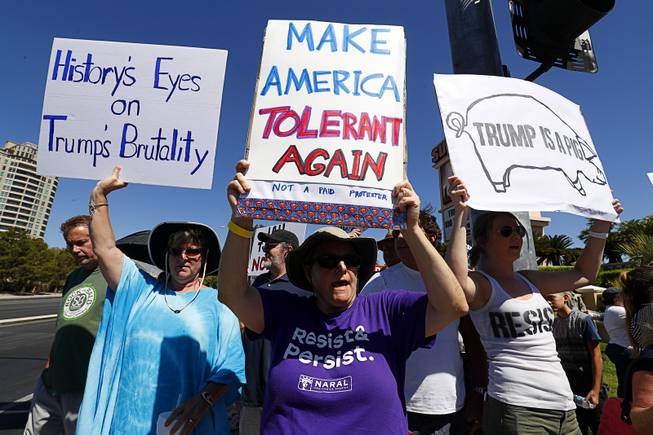
Laurie Lytel, center, and other protesters picket outside the Suncoast before President Donald Trump’s address to the Nevada State GOP Convention in Summerlin on Saturday, June 23, 2018.
Thursday, June 28, 2018 | 2 a.m.
During the past year and a half, Americans have spoken out in droves, donning pink hats for the Women’s March, carrying signs for slain classmates at the March for Our Lives and kneeling at NFL games to bring attention to police brutality against black Americans.
Each of these causes captured the attention of millions who protested in streets across the country, but maintaining that level of political activism and molding it into tangible change requires long-term effort.
Minister Stretch Sanders of All Shades United helped organize the Black Lives Matter march in Las Vegas, in addition to several other marches that brought awareness to unarmed black Americans shot by police officers. He notes that marches and protests are not the end goal, but rather a tool to spread awareness.
More lasting ways to maintain political momentum for social change are to: remind yourself why and for whom you’re doing this; follow the movement and not a leader; have a group of like-minded individuals who support you; be open to learning about social injustice issues that may not affect you directly; and take breaks to invest in self-care so you can avoid burnout.
Additionally, Sanders said it’s important to remember that people can participate in a cause during their day-to-day lives by raising awareness, volunteering in the community and having conversations about racism with family and friends.
“Reactions create moments, revolutionaries create movements,” he said. “That’s what we have to aspire to be—revolutionaries. Even if you’re a teacher, you can be a revolutionary. When you hear the word ‘activist,’ you assume that they have to be out there protesting and marching, but that’s not everybody’s style.”
In January, Las Vegas hosted the national Women’s March #PowerToThePolls event, which attracted 20,000 supporters from across the nation. The event wasn’t just to register people to vote—10,000 registered in Las Vegas that day—but to propel the Women’s March momentum beyond just a moment and encourage attendees to vote for representatives who will honor their best interests. Some of those reps, according to the Center for American Women and Politics include 468 women who filed as U.S. House candidates and 58 who ran for U.S. Senate. It was the largest pool of female congressional candidates in U.S. history, according to The Washington Post. In addition, 61 women filed as candidates for governor nationwide.
Besides voting, people can attend fundraisers, events and marches throughout the year that help support women’s rights—local offshoots of the Women’s March often share events on their Facebook pages.
Activists can also utilize the power of the purse to support businesses and entrepreneurs who rally around their cause. Visit borgenproject.org/global-feminist-companies to research some of these organizations or powertothepolls.com to keep track of the national movement.
•••
In late March, students and supporters across the nation flooded the streets for the shooting survivors of Marjory Stoneman Douglas High School in Parkland, Florida, at the March for Our Lives. The organization then launched its national tour, Road for Change, the first week of June, and it will include more than 50 stops nationwide this summer.
Additionally, the March for Our Lives organizers are planning a separate tour in Florida with more than 25 stops, visiting every congressional district, according to their website.
The national movement is encouraging people to continue their involvement by voting or organizing a voting registration drive, starting a school club to talk about gun violence, or by signing their petition online at marchforourlives.com/sign.
•••
The Trump administration rolled out a zero-tolerance policy seven weeks ago, separating children from their parents seeking asylum at the southern border.
While President Donald Trump signed an executive order to end the policy, more than 2,300 children were already separated from their parents, and most have not been reunited.
Immigration activists across the nation have come up with ways to bring awareness to the after-effects of the policy. ACLU Nevada’s communication manager Wesley Juhl suggests calling or writing to your representatives. Call the White House public comment line at 202-456-111 or the switchboard to speak to an operator at 202-456-1414. Look for organizations donating goods to asylum seekers or join local organizations such as ACLU Nevada.
Additionally, across the nation, there will be protests, including one in Las Vegas on June 30 at 10 a.m. in front of the U.S. Federal Courthouse. You must RSVP to attend. To do so, go here.
This story originally appeared in the Las Vegas Weekly.
